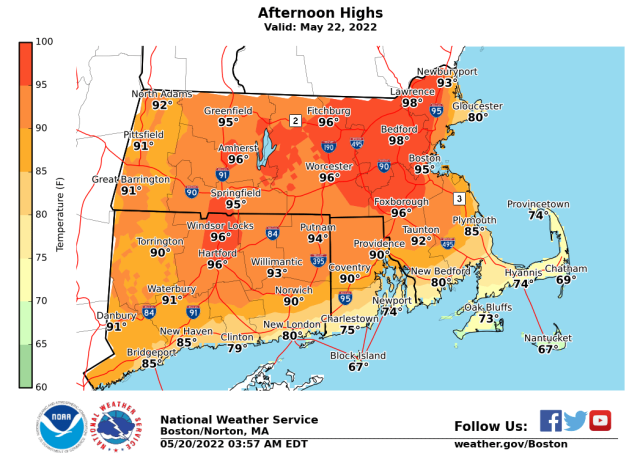With temperatures this weekend forecast to be the highest yet this season, the Brookline Emergency Management Team would like to remind residents to take safety precautions during activities during hot weather, especially those that take place outdoors.
The region is expected to experience unseasonably hot weather Saturday and Sunday with temperatures reaching into the 90s. A heat advisory will be in effect regionally from Saturday, May 21, 2022 at 08:00 a.m. until Sunday, May 22, 2022 at 08:00 p.m.
The town has decided to open several water play areas in parks early this year due to the expected high temperatures. Water play areas will be open in the following locations:
- Waldstein Playground (Dean Road and Strathmore Road / Clinton Path);
- Soule Early Childhood Center (Hammond Street);
- Harry Downes Playground (Pond Avenue and Jamaica Road);
- Emerson Garden(Davis Avenue and Waverly Street);
- Winthrop Square (St. Paul and Freeman Streets);
- Billy Ward Playground (Aspinwall Avenue and Brook Street);
- Clark Playground (Cypress and Edwin Streets);
- Robinson Playground (Cypress and Franklin Streets);
- Coolidge Playground (Columbia and Kenwood Streets);
- Lawton Playground (Lawton Street);
- Corey Hill Playground (Summit Avenue);
- Juniper Playground (Juniper Streets);
- Warren / Eliot Playground (Eliot Street and Ackers Avenue).
To prevent illness and injuries, Brookline Emergency Management recommends the following safety tips from the American Red Cross and National Safety Council:
Heat Safety Tips:
- Drink plenty of fluids, like water, even if you do not feel thirsty, and avoid alcoholic beverages, drinks with caffeine and large amounts of sugar — these actually cause you to lose more body fluid.
- Wear loose-fitting, lightweight, light-colored clothing. Avoid dark colors because they absorb the sun’s rays. Protect yourself from the sun by wearing a wide-brimmed hat, sunglasses, and by putting on sunscreen of SPF 15 or higher 30 minutes prior to going out.
- If you are outside, find shade and minimize direct exposure to the sun. Slow down, stay indoors and avoid strenuous exercise during the hottest part of the day, which is typically around 03:00 p.m.
- Avoid extreme temperature changes.
- Take frequent breaks if working outdoors.
- Check on family, friends and neighbors who do not have air conditioning, who spend much of their time alone or who are more likely to be affected by the heat.
- If someone does not have air conditioning, they should seek relief from the heat during the warmest part of the day in places like libraries, theaters, malls, etc.
- Hot cars can be deadly. Never leave children or pets in your vehicle. The inside temperature of the car can quickly reach over 100 degrees, even on a 70 degree day.
- Check on animals frequently to ensure that they are not suffering from the heat. Make sure they have plenty of cool water.
- Watch for heat cramps, heat exhaustion and heat stroke.
Additional Tips for Parents:
- Limit playtime at peak sun exposure time and familiarize yourself with the signs of heat illnesses.
- Avoid burns. If playground equipment is hot to the touch, it is too hot for your child’s bare skin.
Recognizing Heat Illnesses:
Heat Cramps
Look for:
- heavy sweating during intense exercise;
- muscle pain or spasms.
If you have heat cramps:
- Stop physical activity and move to a cool place.
- Drink water or a sports drink.
- Wait for cramps to go away before you do any more physical activity.
- Get medical help if cramps last longer than 1 hour, you are on a low-sodium diet or if you have heart problems
Heat Exhaustion
Look for:
- heavy sweating; cold, pale, and clammy skin; fast, weak pulse; nausea or vomiting; muscle cramps; tiredness or weakness; dizziness; headache; fainting
If you expect heat exhaustion:
- Move to a cool place Loosen your clothes.
- Put cool, wet cloths on your body or take a cool bath.
- Sip water.
- Get medical help if you are throwing up, your symptoms get worse or symptoms last longer than one hour.
Heat Stroke
Look for:
- high body temperature (103°F or higher); hot, red, dry, or damp skin; fast, strong pulse; headache; dizziness; nausea; confusion; passing out
If you expect a heat stroke:
- Call 911 right away – heat stroke is a medical emergency.
- Move the person to a cooler place.
- Help lower the person’s temperature with cool cloths or a cool bath.
- Do not give the person anything to drink.
Learn more about heat illnesses here.

















